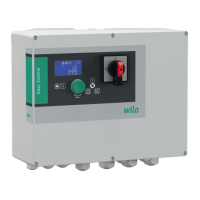en
Installation and operating instructions • Wilo-Control EC-L • Ed.04/2022-09 9
Outputs Hardware
version
Number of inputs
EC-L1... EC-L2... EC-L3...
Potential-free contacts
Collective fault signal (changeover contact) all 1 1 1
Collective run signal (changeover contact) all 1 1 1
Individual fault signal (closed contact (NC)) all 1 2 3
Individual run signal (open contact (NO)) all 1 2 3
Other outputs
Service output (connection value: 24V=, max. 4VA)
E.g. output for connecting an external alarm signal (lamp or horn)
all 1 1 1
Display of the current level value (0...10V=) all 1 1 1
4.6 Type key
Example: Wilo-Control EC-L 2x12A-MT34-DOL-WM-X
EC Easy Control switchgear for fixed-speed pumps
L “Lift” version for water lifting applications
2x Max. number of pumps that can be connected
12A Max. rated current per pump in amperes
MT34 Mains connection:
• M = single-phase current (1~220/230V)
• T34 = three-phase current (3~380/400V)
DOL Pump activation type: Direct
WM Wall fixation
X Versions:
• EMS = without main switch (mains isolator must be provided by the cus-
tomer!)
• IPS = with integrated pressure transducer for direct connection of a dy-
namic pressure bell
4.7 Operation on electronic start-up
controllers
Connect the switchgear directly to the pump and the mains. Intermediate switching of ad-
ditional electronic start-up controllers, e.g. a frequency converter, is not permitted!
4.8 Installation in potentially explosive
atmospheres
The switchgear does not have its own explosion protection class. Do not install the
switchgear in potentially explosive areas!
4.9 Scope of delivery
• Switchgear
• Installation and operating instructions
4.10 Accessories
• Float switch for drainage and sewage
• Level sensor 4...20mA
• Level monitor
• Dynamic pressure bell and bubbling-through system
• Signal lamp 24VDC
• Flash light 230V~
• Horn 230V~
• Rechargeable battery for mains-independent alarm
• Ex cut-off relay
• Zener barrier
5 Transportation and storage
5.1 Delivery
After receiving the shipment, check it immediately for defects (damage, completeness).
The transport company or the manufacturer must be notified of any defects the day the
shipment is received, and the damage noted on the freight documentation. Claims cannot
be asserted if the notification of defects takes place at a later date.

